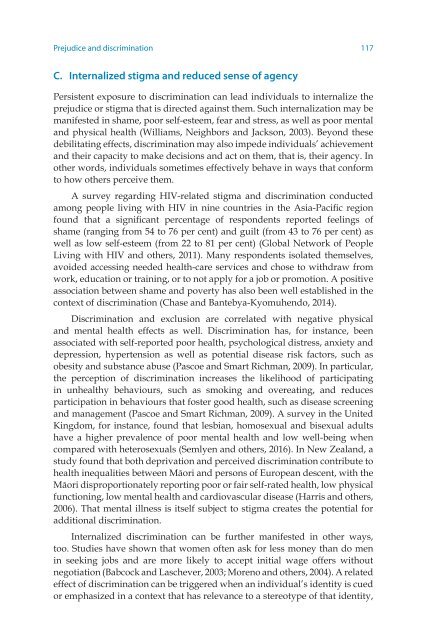Leaving no one behind the imperative of inclusive development
full-report
full-report
You also want an ePaper? Increase the reach of your titles
YUMPU automatically turns print PDFs into web optimized ePapers that Google loves.
Prejudice and discrimination 117<br />
C. Internalized stigma and reduced sense <strong>of</strong> agency<br />
Persistent exposure to discrimination can lead individuals to internalize <strong>the</strong><br />
prejudice or stigma that is directed against <strong>the</strong>m. Such internalization may be<br />
manifested in shame, poor self-esteem, fear and stress, as well as poor mental<br />
and physical health (Williams, Neighbors and Jackson, 2003). Beyond <strong>the</strong>se<br />
debilitating effects, discrimination may also impede individuals’ achievement<br />
and <strong>the</strong>ir capacity to make decisions and act on <strong>the</strong>m, that is, <strong>the</strong>ir agency. In<br />
o<strong>the</strong>r words, individuals sometimes effectively behave in ways that conform<br />
to how o<strong>the</strong>rs perceive <strong>the</strong>m.<br />
A survey regarding HIV-related stigma and discrimination conducted<br />
among people living with HIV in nine countries in <strong>the</strong> Asia-Pacific region<br />
found that a significant percentage <strong>of</strong> respondents reported feelings <strong>of</strong><br />
shame (ranging from 54 to 76 per cent) and guilt (from 43 to 76 per cent) as<br />
well as low self-esteem (from 22 to 81 per cent) (Global Network <strong>of</strong> People<br />
Living with HIV and o<strong>the</strong>rs, 2011). Many respondents isolated <strong>the</strong>mselves,<br />
avoided accessing needed health-care services and chose to withdraw from<br />
work, education or training, or to <strong>no</strong>t apply for a job or promotion. A positive<br />
association between shame and poverty has also been well established in <strong>the</strong><br />
context <strong>of</strong> discrimination (Chase and Bantebya-Kyomuhendo, 2014).<br />
Discrimination and exclusion are correlated with negative physical<br />
and mental health effects as well. Discrimination has, for instance, been<br />
associated with self-reported poor health, psychological distress, anxiety and<br />
depression, hypertension as well as potential disease risk factors, such as<br />
obesity and substance abuse (Pascoe and Smart Richman, 2009). In particular,<br />
<strong>the</strong> perception <strong>of</strong> discrimination increases <strong>the</strong> likelihood <strong>of</strong> participating<br />
in unhealthy behaviours, such as smoking and overeating, and reduces<br />
participation in behaviours that foster good health, such as disease screening<br />
and management (Pascoe and Smart Richman, 2009). A survey in <strong>the</strong> United<br />
Kingdom, for instance, found that lesbian, homosexual and bisexual adults<br />
have a higher prevalence <strong>of</strong> poor mental health and low well-being when<br />
compared with heterosexuals (Semlyen and o<strong>the</strong>rs, 2016). In New Zealand, a<br />
study found that both deprivation and perceived discrimination contribute to<br />
health inequalities between Māori and persons <strong>of</strong> European descent, with <strong>the</strong><br />
Māori disproportionately reporting poor or fair self-rated health, low physical<br />
functioning, low mental health and cardiovascular disease (Harris and o<strong>the</strong>rs,<br />
2006). That mental illness is itself subject to stigma creates <strong>the</strong> potential for<br />
additional discrimination.<br />
Internalized discrimination can be fur<strong>the</strong>r manifested in o<strong>the</strong>r ways,<br />
too. Studies have shown that women <strong>of</strong>ten ask for less m<strong>one</strong>y than do men<br />
in seeking jobs and are more likely to accept initial wage <strong>of</strong>fers without<br />
negotiation (Babcock and Laschever, 2003; More<strong>no</strong> and o<strong>the</strong>rs, 2004). A related<br />
effect <strong>of</strong> discrimination can be triggered when an individual’s identity is cued<br />
or emphasized in a context that has relevance to a stereotype <strong>of</strong> that identity,
















